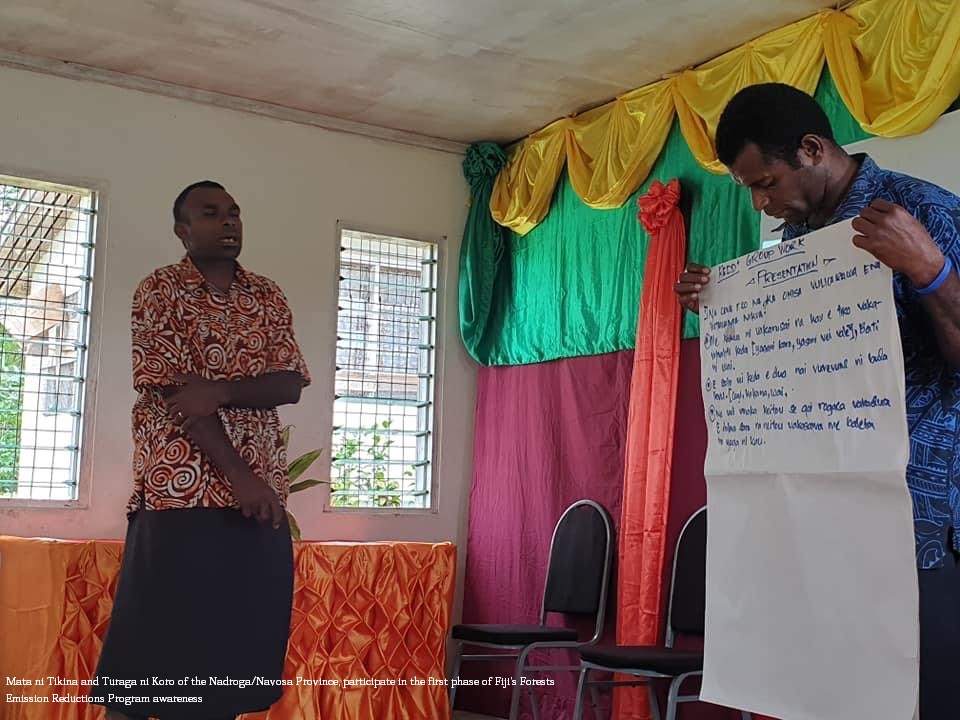Benefit Sharing Plan
According to REDD+ Program Team leader, Mr. Ilaisa Tulele, the other condition of effectiveness met under the ERPA is the development of an advanced draft Benefit Sharing Plan (BSP) that is expected to guide the fair and equitable distribution of carbon benefits generated as a result of the ER-Program.
The advanced draft Plan, developed through an extensive iterative stakeholder consultation process, has drawn from the existing models of benefit sharing mechanisms that are supported by laws and policies; ensuring equitable, transparent and the respect of the rights of the resource owners.
“The Ministry of Forestry has in previous years attempted, with great difficulty, to champion and firmly ground the concepts of Sustainable Forest Management (SFM) and Sustainable Land Management (SLM) in the management of Fiji’s natural landscape. The slow uptake of these concepts has been due to the lack of alternative arrangements, sources and forms of income to match or surpass revenue generated from forest extraction activities, such as mining, harvesting and/or gravel extraction and supporting community-based development projects, which are the main underlying cause to widespread deforestation and forest and land degradation,” he said.
Carbon as an Alternative Income
Mr Tulele said the ER-Program (and the ERPA) has now provided an alternative form of income as an incentive through the result-based payment, to practice sustainable and sound husbandry practices in the management and development of forests and land.
“All participants in the ER-Program will be rewarded and receive an equitable share of the carbon payments based on their level of participation and performance, and is anticipated to change behaviour towards the permanent inculcation of sound management habits and practices.”
The program will address the main drivers of deforestation and forest degradation through integrated land use planning, native forest conservation, and sustainable pine and mahogany plantations. Other aspects will focus on community-driven afforestation, climate-smart agroforestry, and alternative livelihoods initiatives. These efforts are designed to provide job opportunities and improve livelihoods for local communities.
There will also be training and agricultural extension services conducted to establish community plantations and woodlots as well as improving kava and vanilla agroforestry systems. These sustainable land-use techniques help to boost incomes while also reducing pressure on forests.
Halving Carbon Emissions by 2030
Prime Minister Bainimarama continues to emphasise in international forums, including at the recent COP26, the need to reduce global carbon emissions, and importantly to develop national adaptation plans to help communities who are facing the full brunt of the effects of climate change.
“Much of this COP for Fiji is about securing plans that halve global carbon emissions by 2030 –– which we know is necessary to keep 1.5 alive. But today’s discussion isn’t about “1.5” but rather “1.2” –– the fast-approaching threshold of warming that is already devastating so many of our communities.
“We see its consequences in the barren reefs, burning forests, and parched farmlands that have come to define the climate crisis. We, humankind have done this through our reckless levels of carbon emissions. And we are suffering for it alongside every organism on the Earth –– including the very food we eat. Our food systems are buckling under the strain of storms, floods, droughts, erratic weather and the rising seas. If we fail to fortify them, widespread food shortages will feed the forces of chaos. The mass starvation that ensues will lead to mass migration and mass unrest that will render entire societies ungovernable.”
Mr Bainimarama said through a comprehensive and integrated legal framework food security has been included into Fiji’s three year-old National Adaptation Plan to ensure that Fijians can continue to put locally-grown, nutritious produce on the table—even when storms intensify, droughts prolong, and the seas rise. Food security is also one of the adaptation targets in Fiji’s National Determined Contributions (NDCs).
National Action Plan
“Our National Action Plan on Combatting Desertification –– launched in 2007 –– is at work today combating degradation. Eight million seedlings have already gone into the soil since 2019 as part of our commitment to plant 30 million trees in 15 years. Through an Agriculture Rural Land Use Policy, we have adopted sustainable landmanagement technologies with the goal of having no net land degradation by 2050.”
For communities’ participation in Fiji’s Emission Reductions Program, the next step is sitting down to discussing and understanding the impacts of reducing emissions from deforestation and forest degradation, and understanding the solutions through sustainable forest management and sustainable land management.
If communities want to participate in Fiji’s forest ER Program, a formal report from a meeting of their landowning unit endorsing the commitment, with minutes from the meeting, must be submitted to the Ministry of Forestry. Then the community must work with the Ministry and other relevant agencies to identify land that could be leased and committed to appropriate activities under the ER Program.
Small holder farmers with a lease land title or freehold land may wish to write an expression of interest to the Ministry of Forestry.
